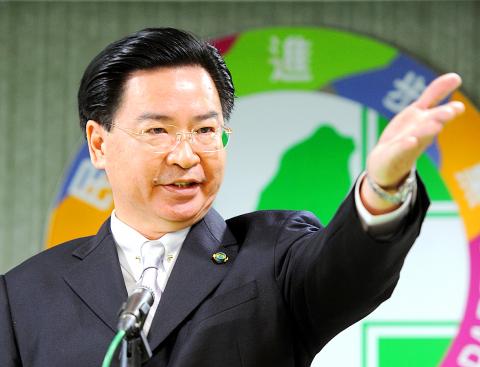Democratic Progressive Party (DPP) Chairman Su Tseng-chang (蘇貞昌) yesterday announced that Joseph Wu (吳釗燮), executive director of the DPP’s Policy Research Committee, will double as the party’s representative to the US, an appointment that has already won praise from the US.
Su told a press conference that since he had assumed the DPP chairmanship, the regional situation surrounding Taiwan had become very dynamic and that consequently, finding the means to strengthen Taiwan’s relations with the US — the nation’s most important ally — had become a key issue for the party.
Su said the party would reopen its representative office in Washington, adding that the first step in that direction was to assign Wu, a former representative to Washington during former president Chen Shui-bian’s (陳水扁) administration, as DPP representative to the US.

Photo: Fang Pin-chao, Taipei Times
Among other tasks, Wu will be responsible for the establishment of the office in the US capital.
“Wu’s performance in Washington [during the Chen administration] was widely appreciated and because he knows both US policy and the DPP’s policies, he is the best candidate to convey the party’s positions to the US side,” Su said.
Because of his responsibilities at DPP headquarters, Wu will not be stationed in Washington, but will visit there regularly, Su said.
Wu said he would not bring domestic politics with him to the US, but would do his utmost to represent the real voices of Taiwanese to Washington.
Wu said that in the future, the party would not only communicate with the US executive branch, but also the US Congress, think tanks and Taiwanese expatriate communities across the US.
Wu said that while he hoped to arrange for Su to visit the US in the near future, the party’s office in Washington had to be operational before this could happen.
The appointment was welcomed within the party.
The DPP must send someone better than President Ma Ying-jeou’s (馬英九) choice of Taipei Economic and Cultural Representative Office representative and former Chinese Nationalist Party (KMT) secretary-general King Pu-tsung (金溥聰), said Lai I-chung (賴怡忠), also a former envoy to the US.
Wu is a capable candidate who is familiar with both the US and China, and will have no problems, Lai said.
Former DPP legislator Kuo Cheng-liang (郭正亮) said it was not common for the opposition party of a nation to have a representative office in another country.
Wu’s role will likely focus on key incidents and issues, and he will be seen more as a “special emissary of the DPP chairperson” rather than a party representative, Kuo said.
However, DPP Legislator Lee Ying-yuan (李應元), a former vice representative to Washington, said the party’s representative to the US should be a full-time job, with the representative stationed permanently in the US.
“Because the job is complicated and the representative also has to deal with the relationships with China, Japan and other countries, the representative should be a full-time job,” Lee said.
Additional reporting by Jake Chung, with CNA

‘ABUSE OF POWER’: Lee Chun-yi allegedly used a Control Yuan vehicle to transport his dog to a pet grooming salon and take his wife to restaurants, media reports said Control Yuan Secretary-General Lee Chun-yi (李俊俋) resigned on Sunday night, admitting that he had misused a government vehicle, as reported by the media. Control Yuan Vice President Lee Hung-chun (李鴻鈞) yesterday apologized to the public over the issue. The watchdog body would follow up on similar accusations made by the Chinese Nationalist Party (KMT) and would investigate the alleged misuse of government vehicles by three other Control Yuan members: Su Li-chiung (蘇麗瓊), Lin Yu-jung (林郁容) and Wang Jung-chang (王榮璋), Lee Hung-chun said. Lee Chun-yi in a statement apologized for using a Control Yuan vehicle to transport his dog to a

Taiwan yesterday denied Chinese allegations that its military was behind a cyberattack on a technology company in Guangzhou, after city authorities issued warrants for 20 suspects. The Guangzhou Municipal Public Security Bureau earlier yesterday issued warrants for 20 people it identified as members of the Information, Communications and Electronic Force Command (ICEFCOM). The bureau alleged they were behind a May 20 cyberattack targeting the backend system of a self-service facility at the company. “ICEFCOM, under Taiwan’s ruling Democratic Progressive Party, directed the illegal attack,” the warrant says. The bureau placed a bounty of 10,000 yuan (US$1,392) on each of the 20 people named in

The High Court yesterday found a New Taipei City woman guilty of charges related to helping Beijing secure surrender agreements from military service members. Lee Huei-hsin (李慧馨) was sentenced to six years and eight months in prison for breaching the National Security Act (國家安全法), making illegal compacts with government employees and bribery, the court said. The verdict is final. Lee, the manager of a temple in the city’s Lujhou District (蘆洲), was accused of arranging for eight service members to make surrender pledges to the Chinese People’s Liberation Army in exchange for money, the court said. The pledges, which required them to provide identification

INDO-PACIFIC REGION: Royal Navy ships exercise the right of freedom of navigation, including in the Taiwan Strait and South China Sea, the UK’s Tony Radakin told a summit Freedom of navigation in the Indo-Pacific region is as important as it is in the English Channel, British Chief of the Defence Staff Admiral Tony Radakin said at a summit in Singapore on Saturday. The remark came as the British Royal Navy’s flagship aircraft carrier, the HMS Prince of Wales, is on an eight-month deployment to the Indo-Pacific region as head of an international carrier strike group. “Upholding the UN Convention on the Law of the Sea, and with it, the principles of the freedom of navigation, in this part of the world matters to us just as it matters in the